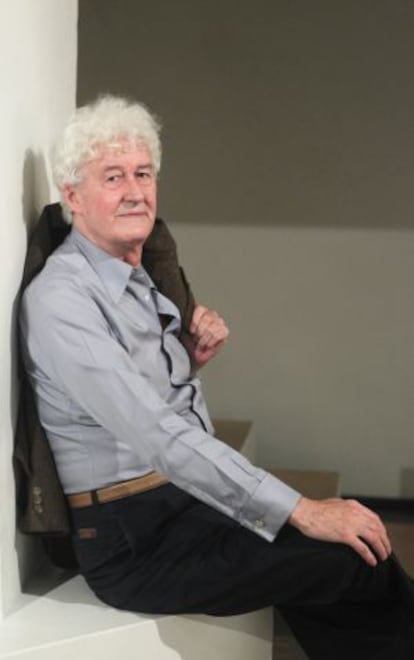Existential poet Félix Grande dies aged 76
The writer provided an essential voice for Spain in a career spanning more than 50 years


Félix Grande, the poet who wrote in just two verses that sólo son verdaderas / las palabras irreparables(the only true words are the irreparable ones) died of cancer on Wednesday in Madrid. He would have been 77 next Tuesday.
Just in case his eight volumes of poetry did not make the relationship between literature and life sufficiently clear, he titled his collected poems Biography, and his last book of poetry Family Book. In it, he talks about the people and things that mattered to him: the writers Vallejo and Machado, flamenco, his wife Francisca Aguirre and his daughter Guadalupe Grande, both poets as well.
He also talks about his mother, a women who kept threatening to commit suicide because, according to her son, she carried “the horror” of the Spanish Civil War within her. His mother used to work at Mérida hospital while his father fought on the Republican side. That is how Félix Grande ended up being born in the capital of Extremadura on February 4, 1937.
A child of the war, he was always torn between two places: Extremadura, where he was born, and Tomelloso (Ciudad Real), where he grew up and will be buried. He was a flamenco guitarist who wrote poetry, and fell somewhere between the generation of the 1950s and the group known as the Novísimos.
Grande combined his two passions, poetry and flamenco, in 'Memoria del flamenco'
In 1964, his Las piedras (The stones) won the Adonais award and publicly inaugurated the career of a writer of expressionist, existential work. His 1967 Blanco spirituals confirmed Félix Grande as a name that would be remembered in the annals of literature.
By the time he earned the most important Spanish poetry award of the era, Grande had been living in Madrid for seven years. At first he was a door-to-door salesman of pomades. But in 1961 he began working with Luis Rosales at the seminal publication Cuadernos Hispanoamericanos, giving a voice to Latin American literature, which had been mostly ignored until the massive boom of the late 1960s. Grande eventually became editor of the publication between 1983 and 1996, when the government of the Popular Party dismissed him in a traumatic episode that he never got over.
Grande also combined his two passions, poetry and flamenco, in Memoria del flamenco, a classic of the genre that won the National Flamencology Award in 1978.
By the time he earned the National Spanish Letters Award in 2004, it seemed as if Grande would never write again. “When the words don’t come, perhaps it is because one deserves it,” he noted about his own 30-year silence. But a visit to Auschwitz triggered a return to poetry, which he defined “as a state of grace, not a literary genre.”
Tu suscripción se está usando en otro dispositivo
¿Quieres añadir otro usuario a tu suscripción?
Si continúas leyendo en este dispositivo, no se podrá leer en el otro.
FlechaTu suscripción se está usando en otro dispositivo y solo puedes acceder a EL PAÍS desde un dispositivo a la vez.
Si quieres compartir tu cuenta, cambia tu suscripción a la modalidad Premium, así podrás añadir otro usuario. Cada uno accederá con su propia cuenta de email, lo que os permitirá personalizar vuestra experiencia en EL PAÍS.
¿Tienes una suscripción de empresa? Accede aquí para contratar más cuentas.
En el caso de no saber quién está usando tu cuenta, te recomendamos cambiar tu contraseña aquí.
Si decides continuar compartiendo tu cuenta, este mensaje se mostrará en tu dispositivo y en el de la otra persona que está usando tu cuenta de forma indefinida, afectando a tu experiencia de lectura. Puedes consultar aquí los términos y condiciones de la suscripción digital.








































